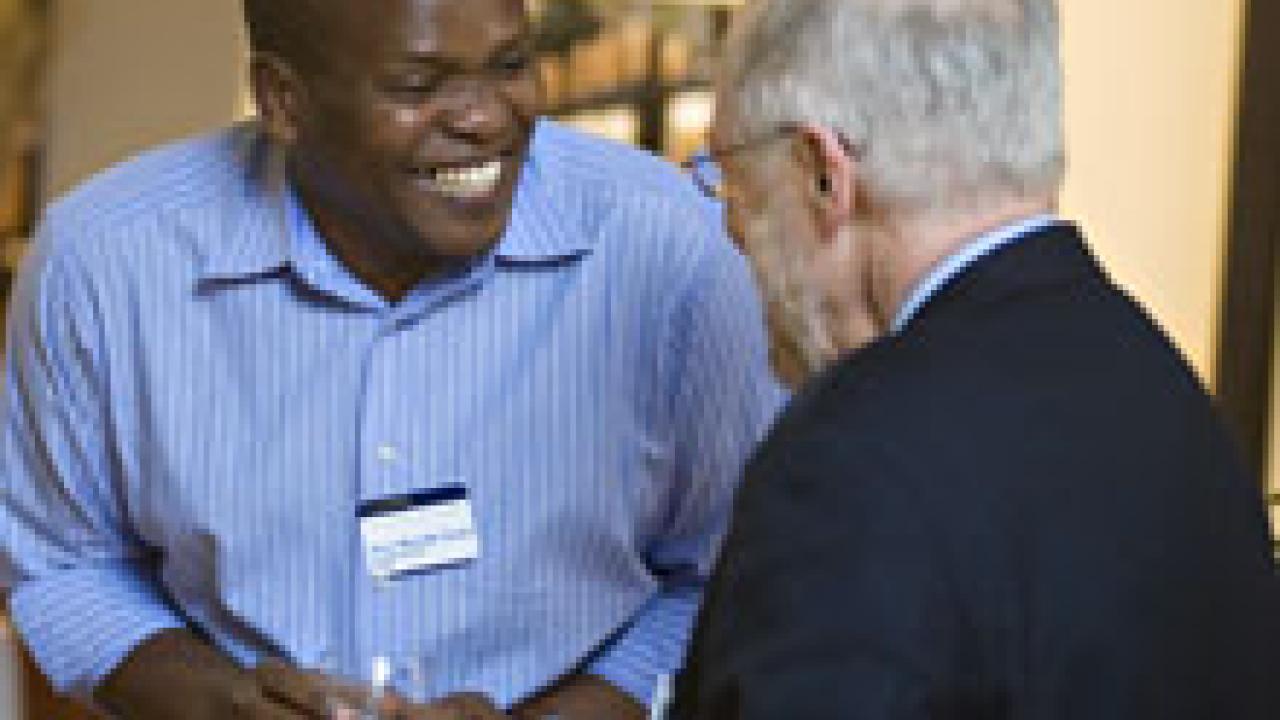“They will be the leaders this world needs to transform itself into a place we desire for our kids.”
That is how Alberto López-Chaves, CEO of the National Chamber of Tourism in Costa Rica, describes his colleagues in UC Davis’ Hubert H. Humphrey Fellowship Program.
The 12 fellows, from nations around the world, come to UC Davis to live and study among their American counterparts for just one year. The goal — to hone their skills and knowledge for the benefit of their native countries.
‘Personal growth’ cited
Though many are already accomplished in their home countries, the Humphrey program provides these mid-career professionals with exposure to current U.S. methods in their related fields and additional professional development. Since the program began in 1978, more than 4,000 professionals representing 150 countries have participated at universities like UC Davis.
According to the program’s Web site, the fellows are selected based on their potential for leadership and dedication to public service in either the public or private sector.
“They all have a desire for personal growth, and a strong commitment to what they can do to help their countries,” said Mark Bell, co-director of the Humphrey Fellowship Program at UC Davis.
Environmental interests
International scholars who specialize in the agricultural or environmental sciences are especially attracted to UC Davis, which has been traditionally strong in these areas. In fact, there has been an increase in the number of people interested in environmental issues worldwide, according to Bell.
Dennis Yiga, a Humphrey fellow and an agricultural officer in Uganda, is looking to alleviate the socioeconomic issues that prevent farmers from entering international markets.
Yiga explained, “The upper class has gone into farming, and those people act as middlemen between the farmers and the international market. They are acting in a pivotal place, because they have an upper hand in determining prices, which are very low.
“The farmer can’t get a handsome profit or any profit at all. He is working for these people to get richer.”
Yiga’s aim during his time at UC Davis is to seek innovative solutions to problems using new technologies. He hopes to transform Uganda’s general resistance to change.
Collaborations, relationships
Academic enrichment isn’t the only benefit of a Humphrey fellowship. It is also a means by which potential foreign leaders can establish positive, long-term relationships with the U.S.
Yiga has already initiated a project, in collaboration with Kurt Kornbluth, director of the Program for International Energy Technologies, to design an irrigation system. Arrangements between UC Davis and Yiga’s home institutions, such as the local government district of Mukono of which Yiga is an employee, have also been made. His main priority is to bring the new irrigation technology back to water-scarce Uganda.
Other scholars are interested in the preservation of natural resources.
American culture: ‘Important’
López-Chaves, from the Costa Rica tourism board, is working to protect the local ecosystem from the 2 million-plus visitors Costa Rica receives each year. Five percent of the world’s biodiversity lies within the country’s 19,652 square miles.
López-Chaves pointed out that Costa Rica was ranked third out of 163 countries in the 2010 Environmental Performance Index, which uses performance indicators to track governmental policy geared toward environmental health and ecosystem vitality.
López-Chaves came to UC Davis to explore how California is working to address the issue of climate change and to learn about American behavior.
“Understanding American culture is important because more than half of our tourists are from the U.S. I can now understand their preferences and needs,” said López-Chaves.
‘A global family’ of support
For these professionals who uproot their lives to move to an unfamiliar country, working together as part of a “support system” is critical.
Hayrullo Esonov, a Humphrey fellow and an agricultural economist from Uzbekistan, said, “Imagine a large family — 12 people with different age, gender, character, behavior, attitude, vision and outlook. It would be difficult for parents to handle them and to tend equally to all of them at the same time.”
He noted, “We truly live as a global family.”
Esonov said he lives with two fellows who “I respect and like as my own brothers. We are sharing almost everything and trying to help each other with tasks, challenges and culture.”
‘They speak very fast’
For example, the difficulty of navigating a bike among many can be overwhelming. “I always thought Asia, particularly China, was a place where bicycles were uncountable, but when I saw the quantity of bikes here I was simply astonished,” said Esonov.
Another challenge is communication — American style, that is.
Yiga of Uganda said, “Americans like to go straight to the point, they speak very fast and they walk with a fast pace. In my culture, you have to internalize and process information before you bring in the real point.”
Though technology is making it increasingly easier to connect with the international community, these Humphrey fellows are reminders that there is nothing quite like immersing yourself in another culture, especially in an increasingly globalized world where knowledge is currency.
Said López-Chaves: “The small world becomes bigger when one starts to meet different people.”
All the Humphrey Fellows
The 2009-10 Humphrey Fellows: López-Chaves of Costa Rica, Yiga of Uganda, Esonov of Uzbekistan, Jean-Marc Francois-Pierre of Haiti, Maria González Seoane of Uruguay, Zenna Sheban Kiwanga of Tanzania, Ly Thi Thanh Le of Vietnam, Peter Mutinda Mutua of Kenya, Mandip Rai of Nepal, Albert Novas Somanje of Zambia, Pericles Weber of Brazil and Biao Xiong of China.
More information on the Humphrey Fellowship Program.
Media Resources
Clifton B. Parker, Dateline, (530) 752-1932, cparker@ucdavis.edu
